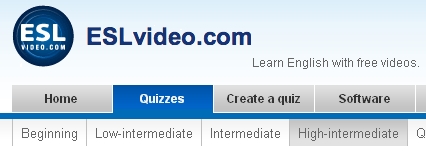One of the first memories that I have is my father filming our family travels with his old Sony video-camera and later recording them into a cassette tape (yes I'm from the cassette tape era don't judge me). Videos, since the introduction of videocameras and video cassette tapes, have been one of the most used tools for almost every application. From videos for recipes, to music instructional to every instruments, videos are one of the sought after tools in education. Videos have been in a constant evolution, from video tape videos to the most recent tools like Youtube, Vimeo, webcams, etc. As a whole, videos are one of the most complete ICT that teachers have at hand when teaching a class because it has almost, not to say all of the elements of the ICT I have mentioned in my previous posts. For example, you can have a video blog oriented to teaching like for example this:
As you can see, videos encompasses both the discursive and visual tools that teachers in any subject can use. As I mentioned earlier, videos have been there for ages in the form of instructional videos, me as a musician consider instructional videos a valuable tool because it haves both the audio elements, the visual elements that help me as a person who is learning get the concepts and knowledge easily. In ESL, and in many areas of teaching videos can be applied as a valuable educational tool, like is in the case of the web page /www.teachwithvideo.com, a project dedicated to teaching any subject through videos. Another we can find is the web page www.eslvideo.com, this web page is dedicated mainly to ESL. The page provides many activities such as songs, unit lessons, quizzes, even exams. To me, eslvideo.com is one of the most complete page for ESL teaching. Another web page is http://www.teachertrainingvideos.com/ a web page to teaching teachers in how to teach and use tools and activities in his or her classrooms.
Another way of using videos as an ICT is through the web page Youtube. Youtube, since its creation in 2007, Youtube has become as one of the most important social tools that people all around the world use, according to the webpage (N.D) more than 1 billion of people visit the page each month. Having said that, teachers can post videos and tutorials that can help people, either students or casual learners and even teachers. An example is the Youtube channel created by this lady called JenniferESL, you can visit her in the following link: https://www.youtube.com/user/JenniferESL, this channel contains tutorials and lessons for beginners, intermediate and advance English students:
To sum up, videos are an amazing tool for teachers to use in their classroom since it is a combination of both images, words and audio elements that facilitates the process of learning to the students. Thanks for reading my post and I invite you all to my Youtube channel in which I'm posting some ESL teaching related videos https://www.youtube.com/channel/UC4NTuk61h5rRHLc_9e1zeDg. Over and out!



